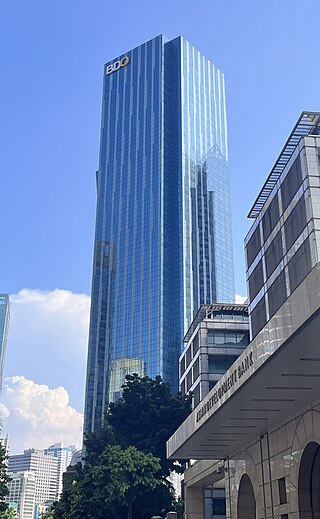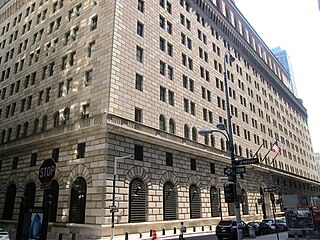Related Research Articles

The Philippine peso, also referred to by its Filipino name piso, is the official currency of the Philippines. It is subdivided into 100 sentimo, also called centavos.

The Bangko Sentral ng Pilipinas is the central bank of the Philippines. It was established on July 3, 1993, pursuant to the provision of Republic Act 7653 or the New Central Bank Act of 1993 as amended by Republic Act 11211 or the New Central Bank Act of 2019. The principal author was Senator Franklin Drilon. It was signed by President Rodrigo Duterte.

The Bank of the Philippine Islands is a universal bank in the Philippines. It is the first bank in both the Philippines and Southeast Asia. It is the fourth largest bank in terms of assets, the second largest bank in terms of market capitalization, and one of the most profitable banks in the Philippines.
BancNet is a Philippine-based interbank network connecting the ATM networks of local and offshore banks, and the country's single interbank network in the Philippines in terms of the number of member banks and annual transactions. Due to its status as the country's single ATM switch operator, it is designated by the Bangko Sentral ng Pilipinas (BSP) as the country's national ATM network.

BDO Unibank, Inc., commonly known as Banco de Oro (BDO), is a Philippine banking company based in Mandaluyong, the Philippines. BDO Unibank is a member of the SM Group and so can be found at SM Malls throughout the country.

The Union Bank of the Philippines, Inc., more commonly known as UnionBank, is one of the universal banks in the Philippines and the ninth largest bank in the country by assets.

The Rizal Commercial Banking Corporation, commonly known as RCBC, is one of the largest universal banks in the Philippines with total consolidated resources of Ph₱ 1.2 trillion. It was established in 1960 as a development bank and is licensed by the Bangko Sentral ng Pilipinas (BSP) for both commercial and investment banking. It is currently headquartered at RCBC Plaza in Makati, Metro Manila.

Export and Industry Bank (EIB), also known as Exportbank, was a commercial bank in the Philippines that operated between 1996 and 2012. It was closed in 2012 by the Central Bank of the Philippines as being insolvent.
"Operation Big Bird" was the attempt of the Philippine Government during the presidency of Corazon Aquino to recover the alleged US$7.5 billion of hidden accounts and assets of President Ferdinand Marcos and his family in the Swiss banks. Conceived by Philippine banker Michael de Guzman, it commenced shortly after Marcos was forced into asylum in the United States. Initially, Operation Big Bird did not recover any money with two differing reports by Representative Victorio Chaves and Senator Jovito Salonga. Chaves laid the blame upon Salonga, Solicitor-General Sedfrey Ordoñez and the Swiss bank lawyers. Salonga countered that Ordoñez had prevented the Philippine government from losing a large sum of money. Evidence suggests that de Guzman acted in good faith on behalf of the new government but that a double cross may have been present.

The Philippine one hundred-peso note (₱100) is a denomination of Philippine currency. Philippine president Manuel A. Roxas is currently featured on the front side of the bill, while the Mayon Volcano and the whale shark are featured on the reverse side.

The Bangladesh Bank robbery, also known colloquially as the Bangladesh Bank cyber heist, was a theft that took place in February 2016. Thirty-five fraudulent instructions were issued by security hackers via the SWIFT network to illegally transfer close to US$1 billion from the Federal Reserve Bank of New York account belonging to Bangladesh Bank, the central bank of Bangladesh. Five of the thirty-five fraudulent instructions were successful in transferring US$101 million, with US$81 million traced to the Philippines and US$20 million to Sri Lanka. The Federal Reserve Bank of New York blocked the remaining thirty transactions, amounting to US$850 million, due to suspicions raised by a misspelled instruction. As of 2018, only around US$18 million of the US$81 million transferred to the Philippines has been recovered, and all the money transferred to Sri Lanka has since been recovered. Most of the money transferred to the Philippines went to four personal accounts, held by single individuals, and not to companies or corporations.
In 2015 and 2016, a series of cyberattacks using the SWIFT banking network were reported, resulting in the successful theft of millions of dollars. The attacks were perpetrated by a hacker group known as APT 38 whose tactics, techniques and procedure overlap with the infamous Lazarus Group who are believed to be behind the Sony attacks. Experts agree that APT 38 was formed following the March 2013 sanctions and the first known operations connected to this group occurred in February 2014. If the attribution to North Korea is accurate, it would be the first known incident of a state actor using cyberattacks to steal funds.

Nestor Aldave Espenilla Jr. was a Filipino banker who served as the fourth governor of the Bangko Sentral ng Pilipinas (BSP) from 2017 until his death in 2019. He began working for the BSP in 1981 and was a deputy governor under his predecessor Amando Tetangco Jr.

On June 7, 2017, the Bank of the Philippine Islands (BPI) suspended its online transaction and automatic teller machine services amidst reports of money missing from its account holders. There was speculation that BPI was compromised by hackers but the bank claimed that the problem was caused by an internal data processing error. The scope of the issue was nationwide according to the bank and also said that only a small portion of its customers were affected and that most of them were in Metro Manila.
GCash is a Filipino mobile payments service owned by Globe Fintech Innovations, Inc., and operated by its wholly-owned subsidiary, G-Xchange, Inc.

The Marcos family, a political family in the Philippines, owns various assets that Philippine courts have determined to have been acquired through illicit means during the presidency of Ferdinand Marcos from 1965–1986. These assets are referred to using several terms, including "ill-gotten wealth" and "unexplained wealth," while some authors such as Belinda Aquino and Philippine Senator Jovito Salonga more bluntly refer to it as the "Marcos Plunder".
Maya, is a Filipino financial services and digital payments company based in Metro Manila, Philippines.
Digital banks in the Philippines are a new formal category of banks which were only approved by the Bangko Sentral ng Pilipinas (BSP), the country's central bank, in 2020. The first such banks launched in the Philippines were Tonik, Overseas Filipino Bank, and UnionDigital of UnionBank Corp. Several more banks were approved by the BSP before 2021, when it announced that it would stop approving the establishment of further digital banks for three years, in order to strengthen the industry and assure healthy competition among its players.
Tonik Digital Bank, Inc., commonly known as Tonik, is an all-digital bank which was launched in the Philippines in 2021, notable for being the first all-digital bank, or "neobank" in Southeast Asia. Its consumer products range from deposits, payments, debit cards, and loans. It operates with its own bank license issued by the Bangko Sentral ng Pilipinas (BSP), with deposits insured by the Philippine Deposit Insurance Corporation (PDIC). Its holding company is Singapore-based Tonik Financial Pte Ltd.
References
- 1 2 3 Samaniego, Art (December 11, 2021). "Hacked BDO accounts are used to buy Bitcoin via UnionBank". Manila Bulletin. Retrieved December 12, 2021.
- ↑ "Philippines battles surge in complaints of account hacking". Bangkok Post. Reuters. December 12, 2021. Retrieved December 12, 2021.
- 1 2 "BDO vows to reimburse fraud victims, strengthen security controls". CNN Philippines. December 12, 2021. Archived from the original on December 12, 2021. Retrieved December 12, 2021.
- ↑ Torregoza, Hannah (December 12, 2021). "Poe calls for swift, transparent probe on bank hacking incident". Manila Bulletin. Retrieved December 12, 2021.
- 1 2 de Guzman, Warren (December 15, 2021). "Biktima ng BDO hack dehado umano sa quitclaim" [Victim of BDO hack at a disadvantage due to quitclaim]. ABS-CBN News (in Filipino). Retrieved December 15, 2021.
- ↑ Cepeda, Mara (December 12, 2021). "BDO clients lose money due to alleged online banking hack". Rappler. Retrieved December 20, 2021.
- ↑ Cordero, Ted (December 15, 2021). "BSP traces two to four hackers behind 'Mark Nagoyo' account". GMA News. Retrieved December 15, 2021.
- 1 2 Baroña, Franco Jose (21 January 2022). "5 arrested in BDO cyberattack". The Manila Times. Retrieved 22 January 2022.
- ↑ Cepeda, Mara (December 12, 2021). "BDO clients lose money due to alleged online banking hack". Rappler. Retrieved December 12, 2021.
- ↑ "Philippine central bank probes complaints of account hacking". South China Morning Post. December 12, 2021. Retrieved December 12, 2021.
- ↑ De Guzman, Warren (December 13, 2021). "Privacy watchdog checks if personal info leaked in BDO incident". ABS-CBN News. Retrieved December 13, 2021.
- ↑ Fenol, Jessica (December 13, 2021). "Globe says ready to help in probe on bank fraud". ABS-CBN News. Retrieved December 13, 2021.
- ↑ Caraballo, Mayvelin (December 14, 2021). "BDO to reimburse 700 clients affected by hacking". The Manila Times. Retrieved December 14, 2021.
- ↑ Chipongian, Lee C. (December 17, 2021). "More financial institutions involved in BDO hacking – BSP". Manila Bulletin. Retrieved December 17, 2021.
- ↑ Patag, Kristine Joy; Luna, Franco (December 13, 2021). "House reps urge inquiry into unauthorized BDO money transfers". The Philippine Star. Retrieved December 13, 2021.
- ↑ Chipongian, Lee (December 12, 2021). "BDO to reimburse affected clients soon; bankers group call for vigilance against cyber crimes". Manila Bulletin. Retrieved December 12, 2021.